2022年人教版中考英语复习之情态动词课件24张
文档属性
| 名称 | 2022年人教版中考英语复习之情态动词课件24张 |  | |
| 格式 | ppt | ||
| 文件大小 | 265.0KB | ||
| 资源类型 | 教案 | ||
| 版本资源 | 通用版 | ||
| 科目 | 英语 | ||
| 更新时间 | 2021-12-29 17:08:16 | ||
图片预览

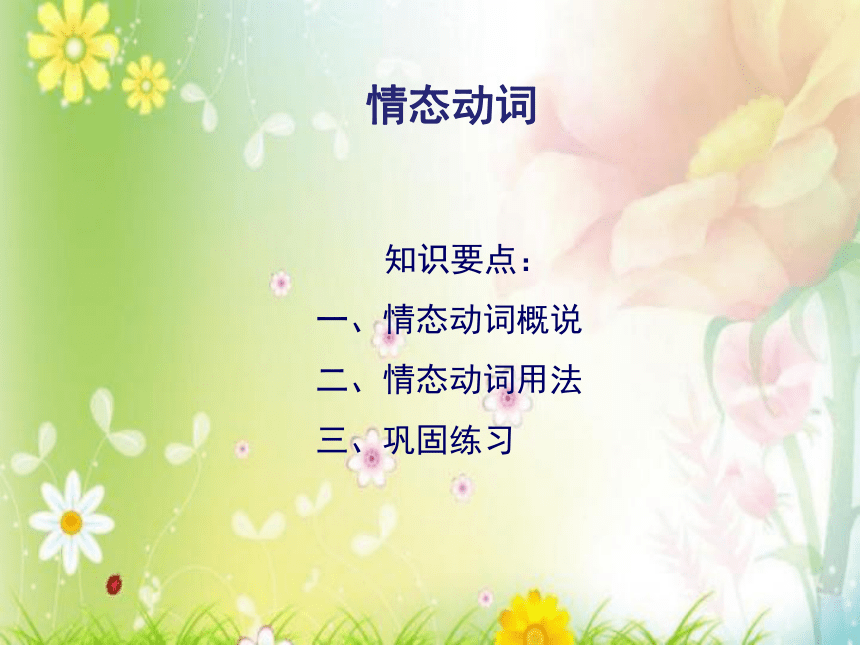


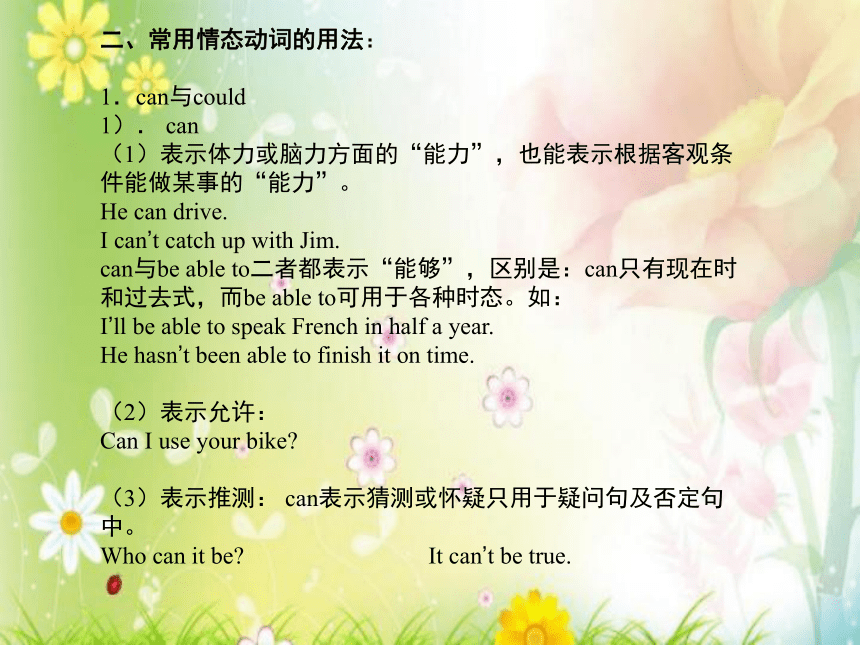
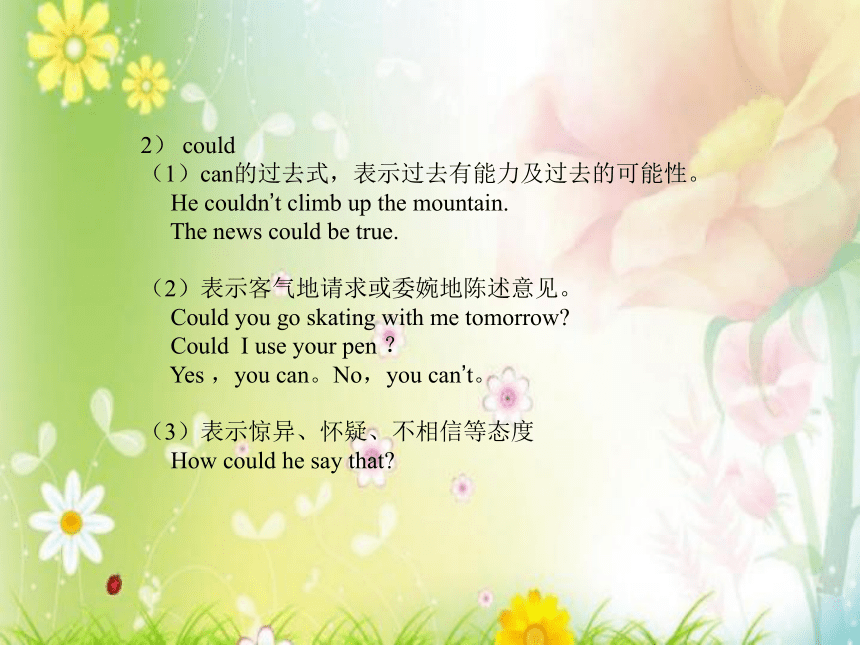
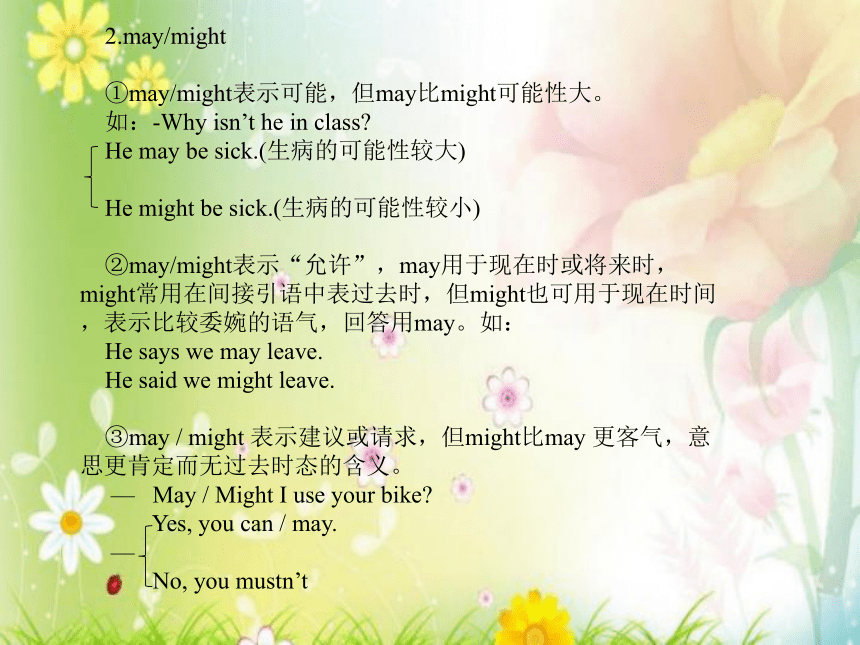
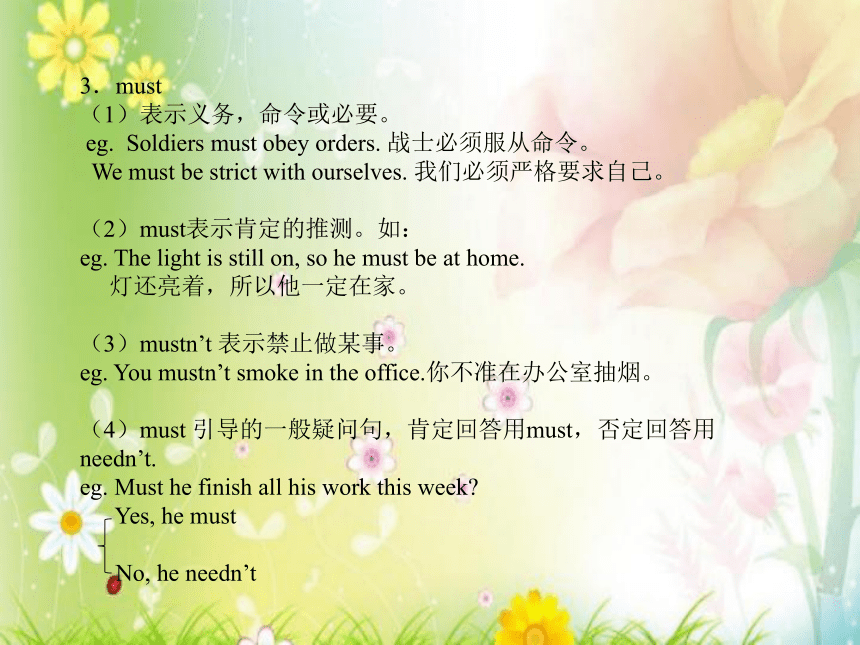
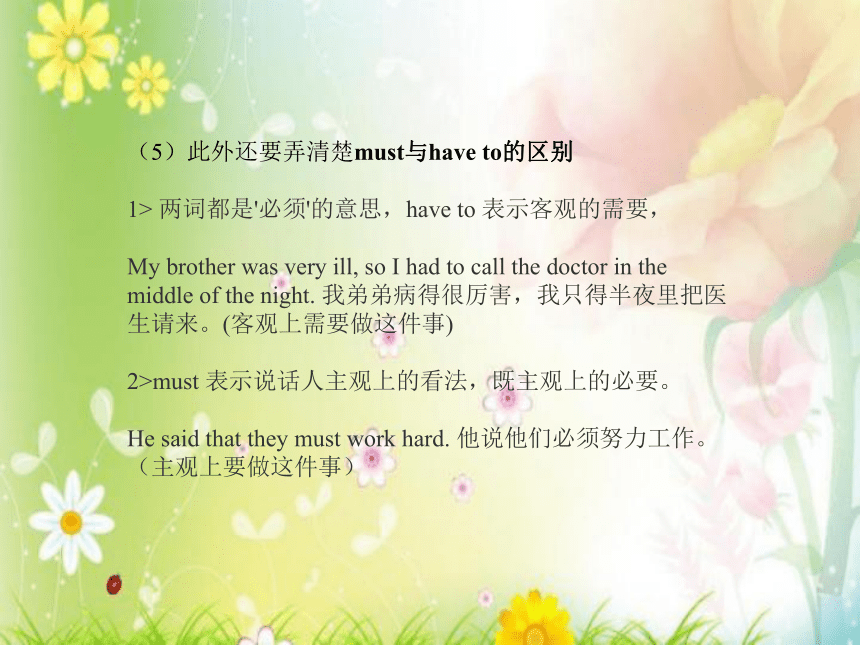
文档简介
(共24张PPT)
专题八 情态动词
中考英语语法专题
本专题内容适用于7—9年级学生
本专题一般共需1课时
情态动词
知识要点:
一、情态动词概说
二、情态动词用法
三、巩固练习
一、情态动词概说
1.情态动词也是“辅助性”动词,用来表示说话人的语气或情态。情态动词所表示的情态有:请求、命令、允诺、可能、需要、敢于、愿望、义务、能力等。
eg: Can you help me
You should finish your homework first.
2.情态动词本身有词义,但词义不完全,不能单独用作谓语,没有人称和数的变化,且后面只跟动词原形。
eg:She can sing an English song.
3.有些情态动词的过去时与其原形相同,有些与原形不同。
4.情态动词的否定形式:
cannot --- can’t could not --- couldn’t
may not--- mayn’t might not--- mightn’t
must not --- mustn’t will not --- won’t
would not --- wouldn’t need not --- needn’t
shall not --- shan’t should not --- shouldn’t
ought not --- oughtn’t dare not --- daren’t
二、常用情态动词的用法:
1.can与could
1). can
(1)表示体力或脑力方面的“能力”,也能表示根据客观条件能做某事的“能力”。
He can drive.
I can’t catch up with Jim.
can与be able to二者都表示“能够”,区别是:can只有现在时和过去式,而be able to可用于各种时态。如:
I’ll be able to speak French in half a year.
He hasn’t been able to finish it on time.
(2)表示允许:
Can I use your bike
(3)表示推测: can表示猜测或怀疑只用于疑问句及否定句中。
Who can it be It can’t be true.
2) could
(1)can的过去式,表示过去有能力及过去的可能性。
He couldn’t climb up the mountain.
The news could be true.
(2)表示客气地请求或委婉地陈述意见。
Could you go skating with me tomorrow
Could I use your pen ?
Yes ,you can。No,you can’t。
(3)表示惊异、怀疑、不相信等态度
How could he say that
2.may/might
①may/might表示可能,但may比might可能性大。
如:-Why isn’t he in class
He may be sick.(生病的可能性较大)
He might be sick.(生病的可能性较小)
②may/might表示“允许”,may用于现在时或将来时,might常用在间接引语中表过去时,但might也可用于现在时间,表示比较委婉的语气,回答用may。如:
He says we may leave.
He said we might leave.
③may / might 表示建议或请求,但might比may 更客气,意思更肯定而无过去时态的含义。
— May / Might I use your bike
Yes, you can / may.
—
No, you mustn’t
3.must
(1)表示义务,命令或必要。
eg. Soldiers must obey orders. 战士必须服从命令。
We must be strict with ourselves. 我们必须严格要求自己。
(2)must表示肯定的推测。如:
eg. The light is still on, so he must be at home.
灯还亮着,所以他一定在家。
(3)mustn’t 表示禁止做某事。
eg. You mustn’t smoke in the office.你不准在办公室抽烟。
(4)must 引导的一般疑问句,肯定回答用must,否定回答用needn’t.
eg. Must he finish all his work this week
Yes, he must
No, he needn’t
(5)此外还要弄清楚must与have to的区别
1> 两词都是'必须'的意思,have to 表示客观的需要,
My brother was very ill, so I had to call the doctor in the middle of the night. 我弟弟病得很厉害,我只得半夜里把医生请来。(客观上需要做这件事)
2>must 表示说话人主观上的看法,既主观上的必要。
He said that they must work hard. 他说他们必须努力工作。(主观上要做这件事)
6.need
1)need意思是“需要,必须”,主要用于否定句和关系问句中。
You needn’t come so early.
Need I take part in the Party
2) need引导的疑问句,肯定回答时多用must,否定回答时用needn’t。
Need he come Yes, he must. /No, he needn’t.
3) need to do sth 实意动词用法
7.will / would
①will 用于各种人称表示“意志”、“意愿”或“决心”等,否定式
won’t + 动词。如:
I will tell you all about it.
Tom won’t do such a thing.
②will用于疑问句中,常用在第二称时表示说话人向对方提出“请求”
或“询问”如:
Will you please tell her the news when you see her
③will 表示习惯性的动作,有“总是”、“惯于”的含义。如:
Fish will die out of water.
④would 表示客气的请求、建议或意愿。如:
Would you please be quiet
Would you like coffee
⑤would 表示过去反复发生的动作。如:
When I passed my school I would see my teachers who taught me 5
years ago.
8. dare
1) dare意思是“敢”,用于肯定结构中时,后接加to的动词不定式。
The boy dared to climb up the tree.
She should dare to question her teacher.
2)dare用于否定句或疑问句中时,与大多数的情态动词一样,后接不带to的动词不定式。
Don't dare do that again!
The poor girl dare not go home.
9.had better
You had better see a doctor.
You had better not leave now.
Had I better wait for her
10.should / ought to
①should和ought to表示应当、应该,前者比后者语气轻。如:
You should / ought to work hard.
②should / ought to work hard.
Since she is not here, we should / ought to be in the classroom.
③should / ought to的否定形式表示禁止之意。如:
Children shouldn’t smoke.
④should可表示陈述意见,推出建议或请求;而ought to可以表示
劝告之意。如:
You ought to respect your parents.
He suggested that they should leave at once.
【典型例题】
1.—Are you coming to Jeff’s party
—I’m not sure. I__________ go to the concert instead.(NMET 2000)
A. must B. would C. should D. might
解析:答案为D。本题考查情态动词的基本用法。由题目中“I’m not
sure”,表
明我可能去Jeff’s party,也可能去音乐会,故用might。
2.—Isn’t that Ann’s husband over there
—No, it be him I’m sure he doesn’t wear glasses.
A. can’t B. must not C. won’t D. may not
解析:答案为A。本题考查情态动词表推测。问:那边的难道不是
Ann的丈夫 吗?答:不是。不可能是他,我确信他不戴眼镜。
3.—Will you stay for lunch
—Sorry, ____________. My brother is coming to see me.
A.I mustn’t B.I can’t C.I needn’t D.I won’t
解析:答案为B。本题考查表示请求的英语口语,用will来向第二人称提问的疑问结构,是表示一种请求和意愿,是用疑问的形式来表达较为婉转的祈使语气,意思是“请你……,好吗”,
对于这种问句的肯定回答是:Suree! Gertainly! Yes, of course. I’d be glad to 等;
否定回答通常是:I’m sorry, I can’t. No, I’m afraid I can’t. I’m sorry, but … I’d like to, but …等。
注意情态动词表客气的用法及其在一般疑问句中的问与答。
1. Nobody _____ do it. Let me _____ .
A. can, try B. can’t, to try C. can, to try D. can’t, trying
2. “ _____ you like ______ bananas to eat ” “ Yes, please.”
A. Would, some B. Will, any C. Could, any D. Can, some
3. “ Can you answer this question in English ” “ Sorry, I _____.”
A. needn’t B. may not C. can’t D. mustn’t
4. “ _____ I borrow your dictionary ” “ Certainly, here you are.”
A. Must B. May C. Need D. Shall
5. I _____ see the words on the blackboard. _____ you write a bit clearly
A. mustn’t, Can B. don’t, will C. can’t, Can D. needn’t, Could
课堂小练
1. Nobody __A___ do it. Let me _____ .
A. can, try B. can’t, to try C. can, to try D. can’t, trying
2. “ ___A__ you like ______ bananas to eat ” “ Yes, please.”
A. Would, some B. Will, any C. Could, any D. Can, some
3. “ Can you answer this question in English ” “ Sorry, I __C___.”
A. needn’t B. may not C. can’t D. mustn’t
4. “ __B___ I borrow your dictionary ” “ Certainly, here you are.”
A. Must B. May C. Need D. Shall
5. I _____ see the words on the blackboard. __C___ you write a bit clearly
A. mustn’t, Can B. don’t, will C. can’t, Can D. needn’t, Could
6. It’s a sunny day today. You ______ take a raincoat with you.
A. can’t B. mustn’t C. needn’t D. can
7. I’ve looked for my pen everywhere, but I ______ find it.
A. couldn’t B. can’t C. mustn’t D. didn’t
8. “ ____ I speak to Ann ” “ Speaking.”
A. Must B. May C. Need D. Shall
9. —Shall we go to the zoo tomorrow
— ________________________.
A. Yes, we shall B. Yes, you shall
C. Yes, you will D. All right
10. —— Mr. John, we must hand in our homework today, ______
—— No, you _____. But you must bring it to school tomorrow.
A. needn't we;mustn't B. mustn't we;needn't
C. mustn't you;mustn't D. needn't we;needn't
6. It’s a sunny day today. You ___C___ take a raincoat with you.
A. can’t B. mustn’t C. needn’t D. can
7. I’ve looked for my pen everywhere, but I ___B___ find it.
A. couldn’t B. can’t C. mustn’t D. didn’t
8. “ __B__ I speak to Ann ” “ Speaking.”
A. Must B. May C. Need D. Shall
9. —Shall we go to the zoo tomorrow
— ________D________________.
A. Yes, we shall B. Yes, you shall
C. Yes, you will D. All right
10. —— Mr. John, we must hand in our homework today, ______
—— No, you __B___. But you must bring it to school tomorrow.
A. needn't we;mustn't B. mustn't we;needn't
C. mustn't you;mustn't D. needn't we;needn't
中考真题
1.(2021贵州铜仁中考)--Must I water the flowers now,mum
--No, you .You do it later.
A.mustn’t;must B.mustn’t;may
C.needn’t;may D.needn’t;must
2.(2021江苏连云港中考)-- I know by what time you want the project to be done
--By the day after tomorrow. you finish it on time
A.May;Can B.Must;Need C.Could;Must D.Need;Would
3.(2021长沙中考)--Who’s singing in the garden
--It be Mr.Brown. He always practices singing at this time.
A.must B.can’t C.need
4.(2021河北中考) I follow you. Would you please repeat it
A.can’t B.mustn’t C.needn’t D.shouldn’t
5.(2021北京中考)--Must I hand in my homework now, Mr. Smith
--No, you .
A.can’t B.shouldn’t C.wouldn’t D.needn’t
C
A
A
A
D
课时总结
原 形 过去式 词 义
can could 1、能 2、can’t表推测:“一定不、肯定不
may might 1、表请求:可以(或许)
2、表推测:有可能It may rain this afternoon. I’m afraid it might snow tomorrow.
must(have/has to must(had to) 1\必须(不得不)must’t 表"禁止",You mustn't tell him about it. 你一定不要把这件事告诉他。
2、表推测:“一定、准是 例1、He must have a car now. ?他一定有辆小汽车。例2、 He must be doing his exercises in the classroom.?他一定在教室里做练习。 He must have finished the work.?(过去发生)?他一定已完成了工作。
will would 愿意
shall should 应该
need needed “需要” needn’t=don't have to 表示"不必" You don't have to tell him about it. 你不一定要把此事告诉他。
dare dared 敢于
情态动词的助记口诀:
情态动词两要点:动词原形跟后边,
没有人称 、数之变,can 表能力,may许可,
must来把责任担(必须),否定回答need换。
need需要 dare敢,should应该,will/would 愿(意),
have to“ 不得不”表客观。表示“建议”和“忠告”,
had better 为最好。 建议某人“最好不 ”,
要用 had better not do。
Thank you for listening
专题八 情态动词
中考英语语法专题
本专题内容适用于7—9年级学生
本专题一般共需1课时
情态动词
知识要点:
一、情态动词概说
二、情态动词用法
三、巩固练习
一、情态动词概说
1.情态动词也是“辅助性”动词,用来表示说话人的语气或情态。情态动词所表示的情态有:请求、命令、允诺、可能、需要、敢于、愿望、义务、能力等。
eg: Can you help me
You should finish your homework first.
2.情态动词本身有词义,但词义不完全,不能单独用作谓语,没有人称和数的变化,且后面只跟动词原形。
eg:She can sing an English song.
3.有些情态动词的过去时与其原形相同,有些与原形不同。
4.情态动词的否定形式:
cannot --- can’t could not --- couldn’t
may not--- mayn’t might not--- mightn’t
must not --- mustn’t will not --- won’t
would not --- wouldn’t need not --- needn’t
shall not --- shan’t should not --- shouldn’t
ought not --- oughtn’t dare not --- daren’t
二、常用情态动词的用法:
1.can与could
1). can
(1)表示体力或脑力方面的“能力”,也能表示根据客观条件能做某事的“能力”。
He can drive.
I can’t catch up with Jim.
can与be able to二者都表示“能够”,区别是:can只有现在时和过去式,而be able to可用于各种时态。如:
I’ll be able to speak French in half a year.
He hasn’t been able to finish it on time.
(2)表示允许:
Can I use your bike
(3)表示推测: can表示猜测或怀疑只用于疑问句及否定句中。
Who can it be It can’t be true.
2) could
(1)can的过去式,表示过去有能力及过去的可能性。
He couldn’t climb up the mountain.
The news could be true.
(2)表示客气地请求或委婉地陈述意见。
Could you go skating with me tomorrow
Could I use your pen ?
Yes ,you can。No,you can’t。
(3)表示惊异、怀疑、不相信等态度
How could he say that
2.may/might
①may/might表示可能,但may比might可能性大。
如:-Why isn’t he in class
He may be sick.(生病的可能性较大)
He might be sick.(生病的可能性较小)
②may/might表示“允许”,may用于现在时或将来时,might常用在间接引语中表过去时,但might也可用于现在时间,表示比较委婉的语气,回答用may。如:
He says we may leave.
He said we might leave.
③may / might 表示建议或请求,但might比may 更客气,意思更肯定而无过去时态的含义。
— May / Might I use your bike
Yes, you can / may.
—
No, you mustn’t
3.must
(1)表示义务,命令或必要。
eg. Soldiers must obey orders. 战士必须服从命令。
We must be strict with ourselves. 我们必须严格要求自己。
(2)must表示肯定的推测。如:
eg. The light is still on, so he must be at home.
灯还亮着,所以他一定在家。
(3)mustn’t 表示禁止做某事。
eg. You mustn’t smoke in the office.你不准在办公室抽烟。
(4)must 引导的一般疑问句,肯定回答用must,否定回答用needn’t.
eg. Must he finish all his work this week
Yes, he must
No, he needn’t
(5)此外还要弄清楚must与have to的区别
1> 两词都是'必须'的意思,have to 表示客观的需要,
My brother was very ill, so I had to call the doctor in the middle of the night. 我弟弟病得很厉害,我只得半夜里把医生请来。(客观上需要做这件事)
2>must 表示说话人主观上的看法,既主观上的必要。
He said that they must work hard. 他说他们必须努力工作。(主观上要做这件事)
6.need
1)need意思是“需要,必须”,主要用于否定句和关系问句中。
You needn’t come so early.
Need I take part in the Party
2) need引导的疑问句,肯定回答时多用must,否定回答时用needn’t。
Need he come Yes, he must. /No, he needn’t.
3) need to do sth 实意动词用法
7.will / would
①will 用于各种人称表示“意志”、“意愿”或“决心”等,否定式
won’t + 动词。如:
I will tell you all about it.
Tom won’t do such a thing.
②will用于疑问句中,常用在第二称时表示说话人向对方提出“请求”
或“询问”如:
Will you please tell her the news when you see her
③will 表示习惯性的动作,有“总是”、“惯于”的含义。如:
Fish will die out of water.
④would 表示客气的请求、建议或意愿。如:
Would you please be quiet
Would you like coffee
⑤would 表示过去反复发生的动作。如:
When I passed my school I would see my teachers who taught me 5
years ago.
8. dare
1) dare意思是“敢”,用于肯定结构中时,后接加to的动词不定式。
The boy dared to climb up the tree.
She should dare to question her teacher.
2)dare用于否定句或疑问句中时,与大多数的情态动词一样,后接不带to的动词不定式。
Don't dare do that again!
The poor girl dare not go home.
9.had better
You had better see a doctor.
You had better not leave now.
Had I better wait for her
10.should / ought to
①should和ought to表示应当、应该,前者比后者语气轻。如:
You should / ought to work hard.
②should / ought to work hard.
Since she is not here, we should / ought to be in the classroom.
③should / ought to的否定形式表示禁止之意。如:
Children shouldn’t smoke.
④should可表示陈述意见,推出建议或请求;而ought to可以表示
劝告之意。如:
You ought to respect your parents.
He suggested that they should leave at once.
【典型例题】
1.—Are you coming to Jeff’s party
—I’m not sure. I__________ go to the concert instead.(NMET 2000)
A. must B. would C. should D. might
解析:答案为D。本题考查情态动词的基本用法。由题目中“I’m not
sure”,表
明我可能去Jeff’s party,也可能去音乐会,故用might。
2.—Isn’t that Ann’s husband over there
—No, it be him I’m sure he doesn’t wear glasses.
A. can’t B. must not C. won’t D. may not
解析:答案为A。本题考查情态动词表推测。问:那边的难道不是
Ann的丈夫 吗?答:不是。不可能是他,我确信他不戴眼镜。
3.—Will you stay for lunch
—Sorry, ____________. My brother is coming to see me.
A.I mustn’t B.I can’t C.I needn’t D.I won’t
解析:答案为B。本题考查表示请求的英语口语,用will来向第二人称提问的疑问结构,是表示一种请求和意愿,是用疑问的形式来表达较为婉转的祈使语气,意思是“请你……,好吗”,
对于这种问句的肯定回答是:Suree! Gertainly! Yes, of course. I’d be glad to 等;
否定回答通常是:I’m sorry, I can’t. No, I’m afraid I can’t. I’m sorry, but … I’d like to, but …等。
注意情态动词表客气的用法及其在一般疑问句中的问与答。
1. Nobody _____ do it. Let me _____ .
A. can, try B. can’t, to try C. can, to try D. can’t, trying
2. “ _____ you like ______ bananas to eat ” “ Yes, please.”
A. Would, some B. Will, any C. Could, any D. Can, some
3. “ Can you answer this question in English ” “ Sorry, I _____.”
A. needn’t B. may not C. can’t D. mustn’t
4. “ _____ I borrow your dictionary ” “ Certainly, here you are.”
A. Must B. May C. Need D. Shall
5. I _____ see the words on the blackboard. _____ you write a bit clearly
A. mustn’t, Can B. don’t, will C. can’t, Can D. needn’t, Could
课堂小练
1. Nobody __A___ do it. Let me _____ .
A. can, try B. can’t, to try C. can, to try D. can’t, trying
2. “ ___A__ you like ______ bananas to eat ” “ Yes, please.”
A. Would, some B. Will, any C. Could, any D. Can, some
3. “ Can you answer this question in English ” “ Sorry, I __C___.”
A. needn’t B. may not C. can’t D. mustn’t
4. “ __B___ I borrow your dictionary ” “ Certainly, here you are.”
A. Must B. May C. Need D. Shall
5. I _____ see the words on the blackboard. __C___ you write a bit clearly
A. mustn’t, Can B. don’t, will C. can’t, Can D. needn’t, Could
6. It’s a sunny day today. You ______ take a raincoat with you.
A. can’t B. mustn’t C. needn’t D. can
7. I’ve looked for my pen everywhere, but I ______ find it.
A. couldn’t B. can’t C. mustn’t D. didn’t
8. “ ____ I speak to Ann ” “ Speaking.”
A. Must B. May C. Need D. Shall
9. —Shall we go to the zoo tomorrow
— ________________________.
A. Yes, we shall B. Yes, you shall
C. Yes, you will D. All right
10. —— Mr. John, we must hand in our homework today, ______
—— No, you _____. But you must bring it to school tomorrow.
A. needn't we;mustn't B. mustn't we;needn't
C. mustn't you;mustn't D. needn't we;needn't
6. It’s a sunny day today. You ___C___ take a raincoat with you.
A. can’t B. mustn’t C. needn’t D. can
7. I’ve looked for my pen everywhere, but I ___B___ find it.
A. couldn’t B. can’t C. mustn’t D. didn’t
8. “ __B__ I speak to Ann ” “ Speaking.”
A. Must B. May C. Need D. Shall
9. —Shall we go to the zoo tomorrow
— ________D________________.
A. Yes, we shall B. Yes, you shall
C. Yes, you will D. All right
10. —— Mr. John, we must hand in our homework today, ______
—— No, you __B___. But you must bring it to school tomorrow.
A. needn't we;mustn't B. mustn't we;needn't
C. mustn't you;mustn't D. needn't we;needn't
中考真题
1.(2021贵州铜仁中考)--Must I water the flowers now,mum
--No, you .You do it later.
A.mustn’t;must B.mustn’t;may
C.needn’t;may D.needn’t;must
2.(2021江苏连云港中考)-- I know by what time you want the project to be done
--By the day after tomorrow. you finish it on time
A.May;Can B.Must;Need C.Could;Must D.Need;Would
3.(2021长沙中考)--Who’s singing in the garden
--It be Mr.Brown. He always practices singing at this time.
A.must B.can’t C.need
4.(2021河北中考) I follow you. Would you please repeat it
A.can’t B.mustn’t C.needn’t D.shouldn’t
5.(2021北京中考)--Must I hand in my homework now, Mr. Smith
--No, you .
A.can’t B.shouldn’t C.wouldn’t D.needn’t
C
A
A
A
D
课时总结
原 形 过去式 词 义
can could 1、能 2、can’t表推测:“一定不、肯定不
may might 1、表请求:可以(或许)
2、表推测:有可能It may rain this afternoon. I’m afraid it might snow tomorrow.
must(have/has to must(had to) 1\必须(不得不)must’t 表"禁止",You mustn't tell him about it. 你一定不要把这件事告诉他。
2、表推测:“一定、准是 例1、He must have a car now. ?他一定有辆小汽车。例2、 He must be doing his exercises in the classroom.?他一定在教室里做练习。 He must have finished the work.?(过去发生)?他一定已完成了工作。
will would 愿意
shall should 应该
need needed “需要” needn’t=don't have to 表示"不必" You don't have to tell him about it. 你不一定要把此事告诉他。
dare dared 敢于
情态动词的助记口诀:
情态动词两要点:动词原形跟后边,
没有人称 、数之变,can 表能力,may许可,
must来把责任担(必须),否定回答need换。
need需要 dare敢,should应该,will/would 愿(意),
have to“ 不得不”表客观。表示“建议”和“忠告”,
had better 为最好。 建议某人“最好不 ”,
要用 had better not do。
Thank you for listening
同课章节目录
- 词法
- 名词
- 动词和动词短语
- 动词语态
- 动词时态
- 助动词和情态动词
- 非谓语动词
- 冠词
- 代词
- 数词和量词
- 形容词副词及其比较等级
- 介词和介词短语
- 连词和感叹词
- 构词法
- 相似、相近词比较
- 句法
- 陈述句
- 一般疑问句和否定疑问句
- 特殊疑问句及选择疑问句
- 反意疑问句
- 存在句(There be句型)
- 宾语从句
- 定语从句
- 状语从句
- 主谓一致问题
- 简单句
- 并列句
- 复合句
- 主谓一致
- 主、表语从句
- 名词性从句
- 直接引语和间接引语
- 虚拟语气
- 感叹句
- 强调句
- 倒装句
- 祈使句
- 句子的成分
- 句子的分类
- 题型专区
- 单项选择部分
- 易错题
- 完形填空
- 阅读理解
- 词汇练习
- 听说训练
- 句型转换
- 补全对话
- 短文改错
- 翻译
- 书面表达
- 任务型阅读
- 语法填空
- 其他资料
